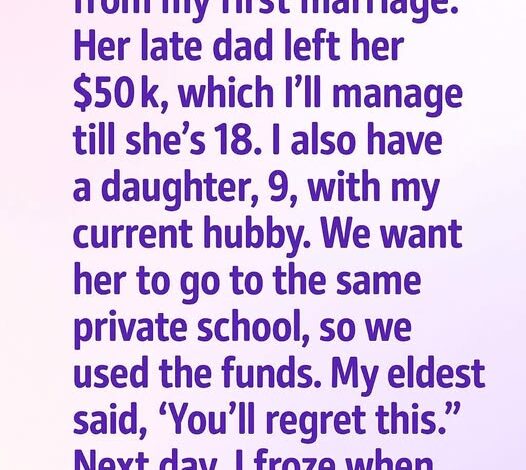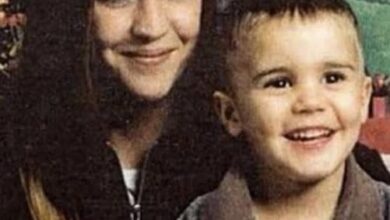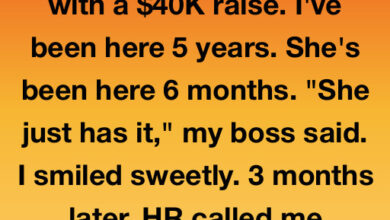
A Daughters Legacy, The Day I Almost Lost Her Trust Forever
I have two daughters—and one mistake that nearly shattered everything between us.
Lily, my oldest, is sixteen. She’s strong, thoughtful, and carries a quiet resilience that reminds me of her father, my first husband. When he passed away, he left her $50,000. That money became more than a number in a bank account. It was a promise, a legacy, and a connection to the parent she had lost too soon. I was named custodian of the account, and for years I told her it was for her future—for college, a first apartment, or whatever dream she chose when she turned eighteen. She trusted me with it completely.
Then there’s Emma, my youngest, just nine years old. She’s bright, mischievous, and full of the kind of energy that makes you both laugh and ache with exhaustion. My current husband and I wanted Emma to attend the same private school Lily had once gone to. We told ourselves it was about fairness, about giving both daughters “equal opportunities.” We told ourselves it would be temporary, that we’d replenish what we borrowed. We told ourselves a lot of comforting lies while our bank account shouted a hard no.
And so, against every whisper of conscience, we dipped into Lily’s inheritance.
When Lily discovered what we had done, she didn’t scream. She didn’t slam doors or hurl accusations. Instead, she looked at me with eyes so cold and unfamiliar that my stomach dropped. In a voice quieter than I’ve ever heard from her, she said, “You’ll regret this.”
I brushed it off at first, telling myself it was teenage melodrama. I convinced myself she’d cool down after some time. But the next morning, I walked into the living room and froze.
There she was—sitting on the couch with her backpack strapped to her shoulders and a small suitcase by her feet. Her eyes were swollen from crying all night. When she looked up, I saw her father’s face reflected in hers—his strength, his disappointment.
“Mom,” she whispered, her voice cracking, “I don’t feel like this is my home anymore.”
Something inside me broke clean in half. It wasn’t about the school, and it wasn’t even about the money. That account wasn’t just savings. To Lily, it was her father’s last gift, the one thing he had left to anchor her future. By dipping into it, I hadn’t just taken dollars—I had taken a piece of him away from her. I had told myself I was being “fair,” but to her, it was betrayal.
I sat down beside her and reached for her trembling hands. Words tumbled out faster than my tears. “I’m sorry. I didn’t see it. I thought I was doing the right thing. I was wrong.”
We cried together, and for the first time in too long, we talked—truly talked. Lily told me how it felt to watch me protect everyone else’s future while stealing from hers. I admitted that I’ve been terrified of failing both girls, and how that fear had pushed me into a terrible decision.
That night, I told my husband we were fixing it. Not with empty speeches, but with money. Every cent we took would go back, no matter what it took. To my relief, he agreed without argument.
We began immediately—tightening our budget, cooking every meal at home, selling the treadmill that had been gathering dust, and taking on extra shifts where we could. Each deposit back into Lily’s account felt like laying down another plank on a bridge I had set on fire. Slowly, painfully, we were rebuilding.
Things aren’t perfect now. Lily talks to me again, but carefully, as though approaching a skittish animal that might bite. She keeps her suitcase tucked away in her closet instead of by the door, but I know she hasn’t forgotten how close she came to leaving. Sometimes I catch her studying the bank statements, following the deposits with her finger the way a child might trace the lines of a familiar map.
Emma, too young to grasp the full story, asked me one night why her sister seemed so sad. I told her gently, “Because sometimes grown-ups forget what matters most.” It was the truest answer I could give.
Here’s what I’ve learned: love isn’t math. It’s not about splitting everything into equal shares and calling it “fair.” Love means recognizing that what feels fair on the outside can feel like erasure on the inside. To Lily, that account was sacred. It wasn’t just money—it was a promise, her father’s last “I love you.” By taking from it, I hadn’t balanced the scales. I had betrayed her trust.
We’re still repairing that trust, one step at a time. And while it will take months to fully restore her account, I’m determined to make it whole. More importantly, I’m determined to show Lily—through actions, not words—that her story, her loss, and her future matter as much as life itself.
Our family won’t heal overnight. But I know this: I won’t let fear steer me into betrayal again. In this house, from now on, “equal opportunities” will never come at the expense of one daughter’s legacy.
Because love isn’t about balance sheets. It’s about promises kept, wounds acknowledged, and rebuilding the bridges we almost burned. And I will spend the rest of my life making sure Lily knows she can trust me again.




